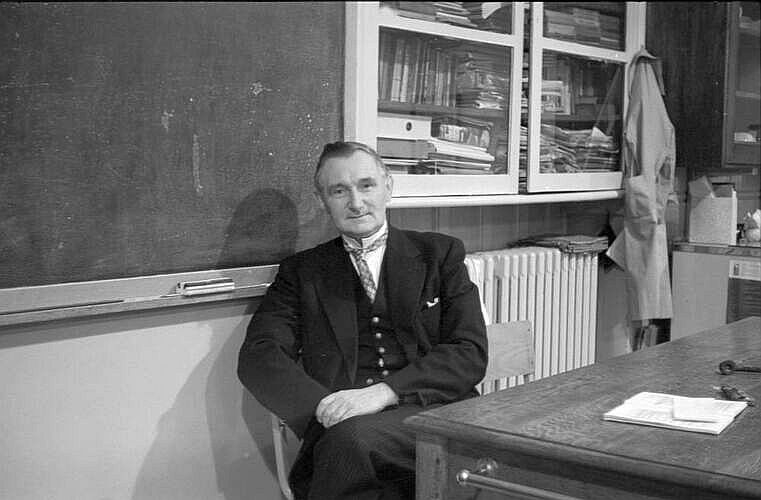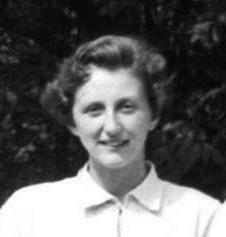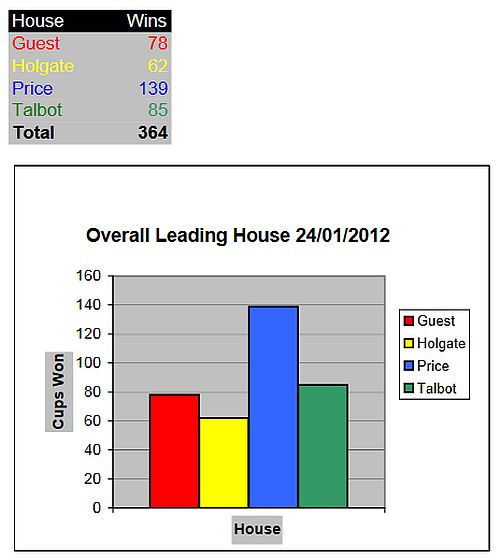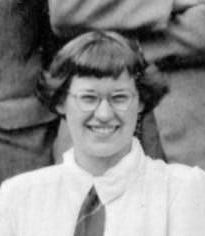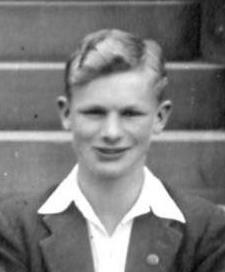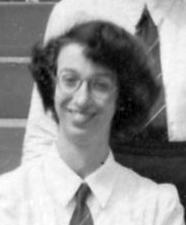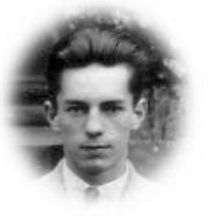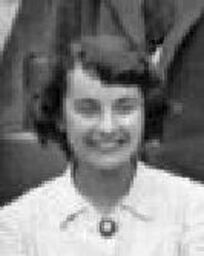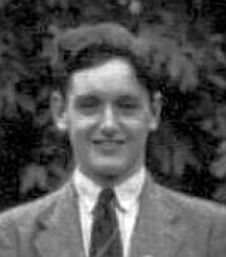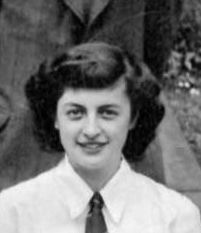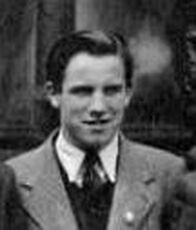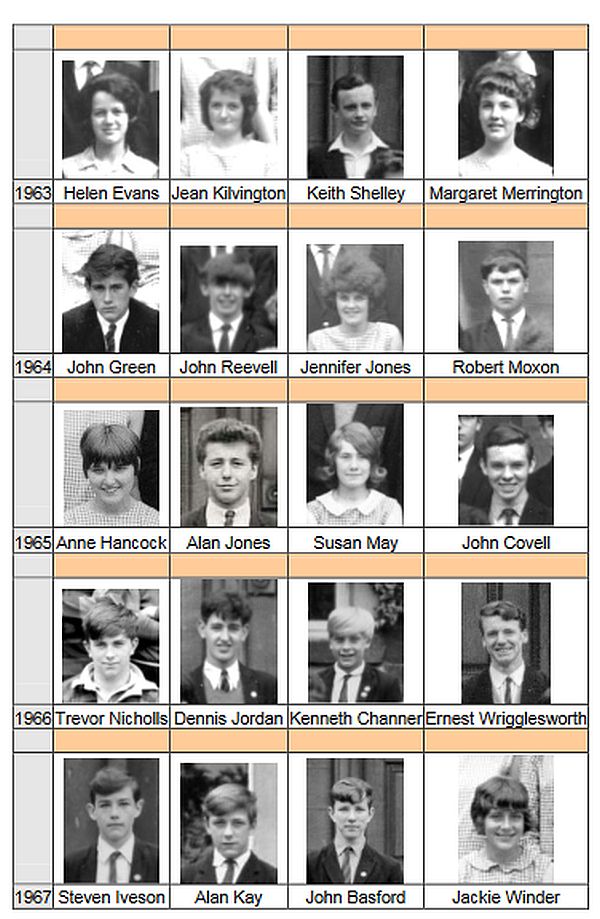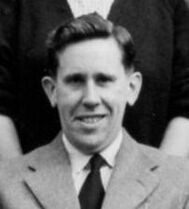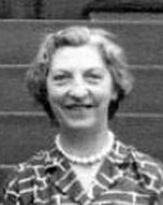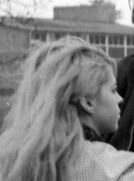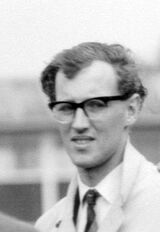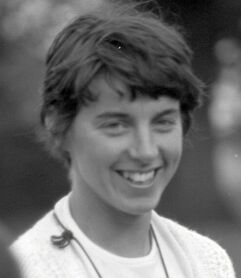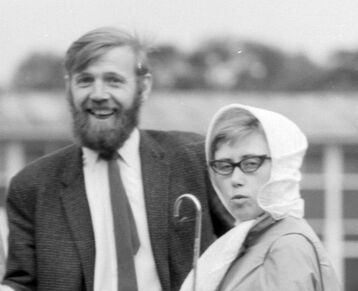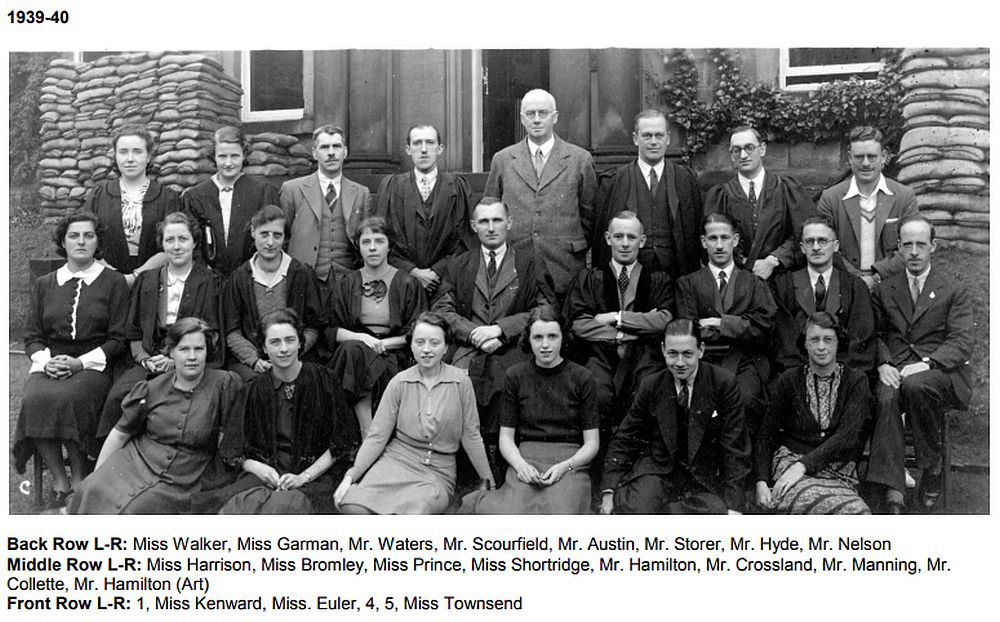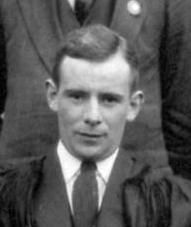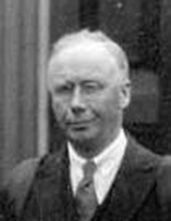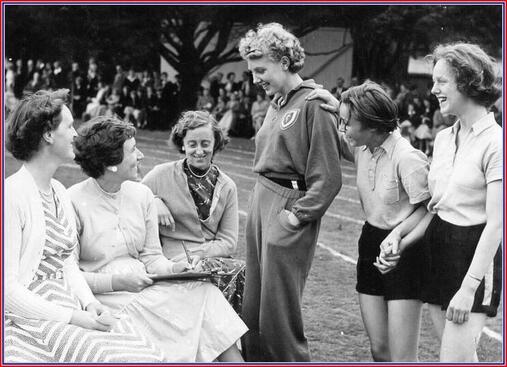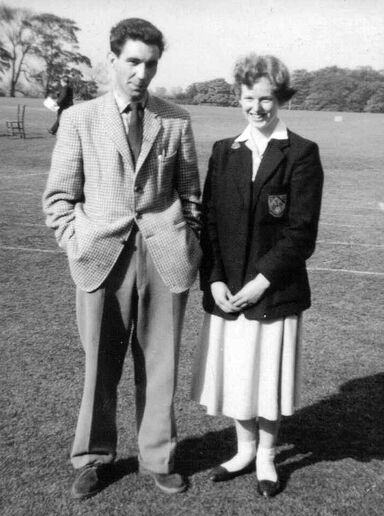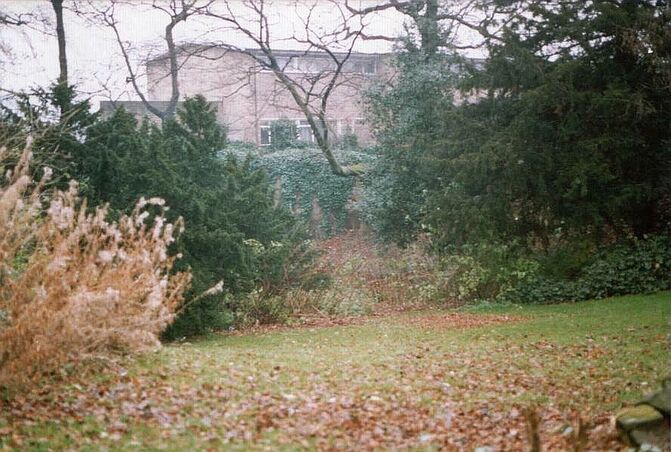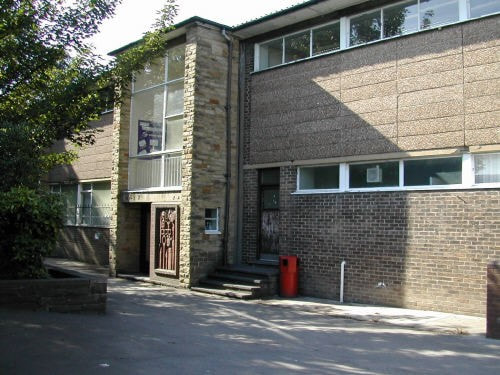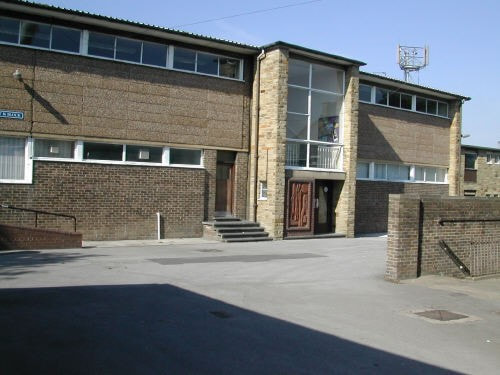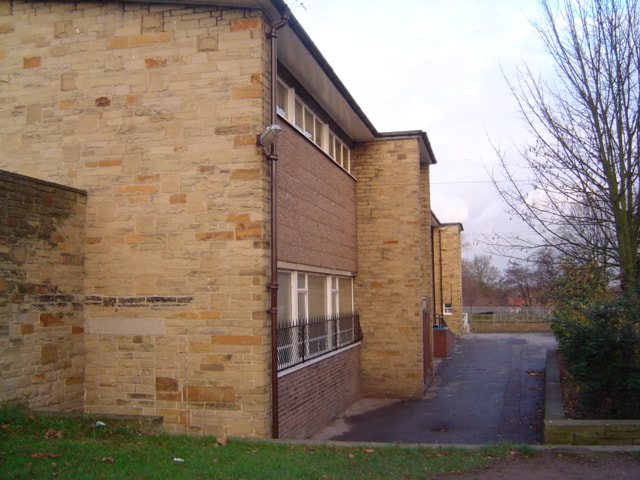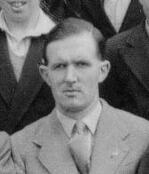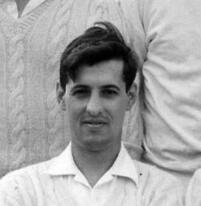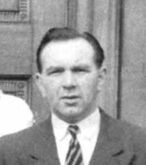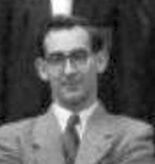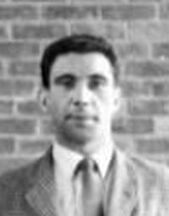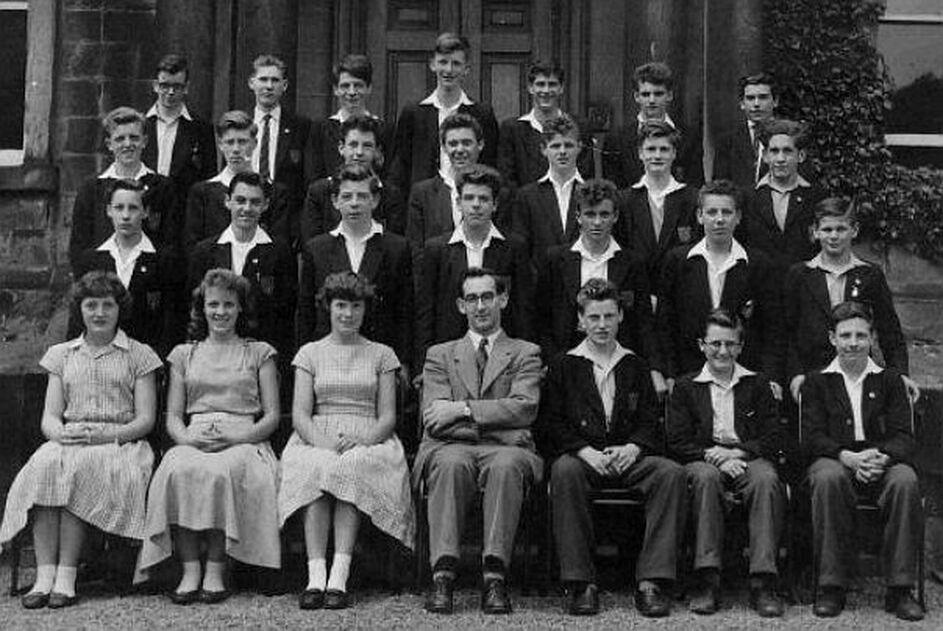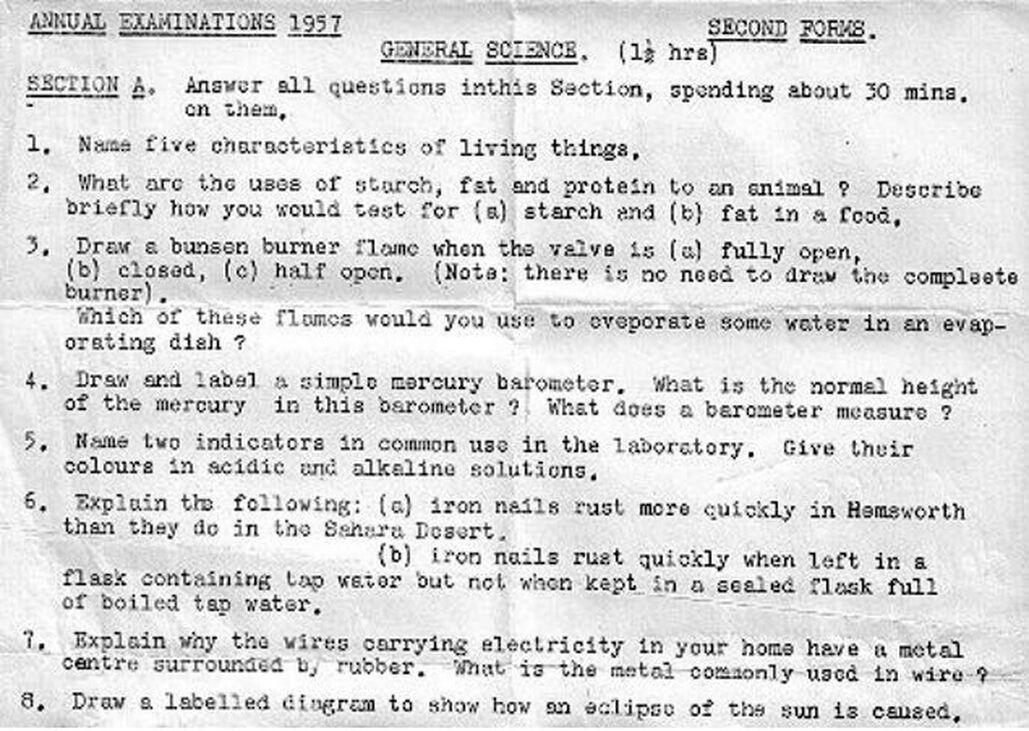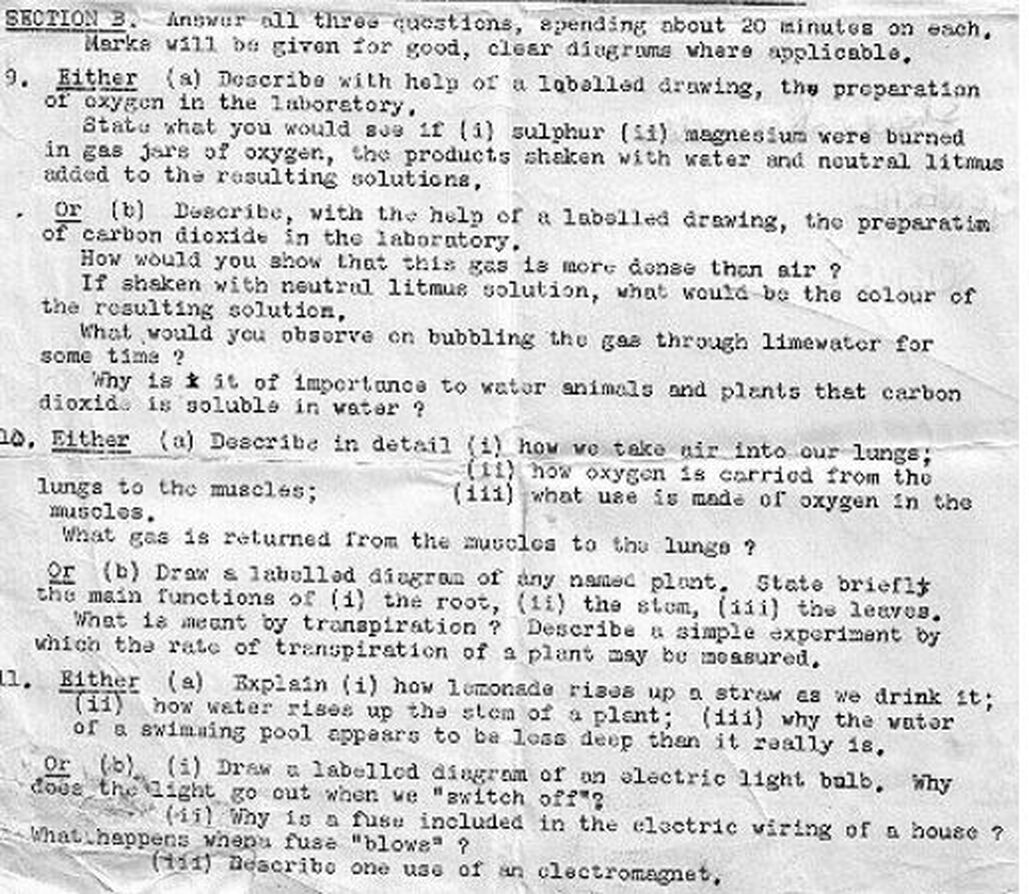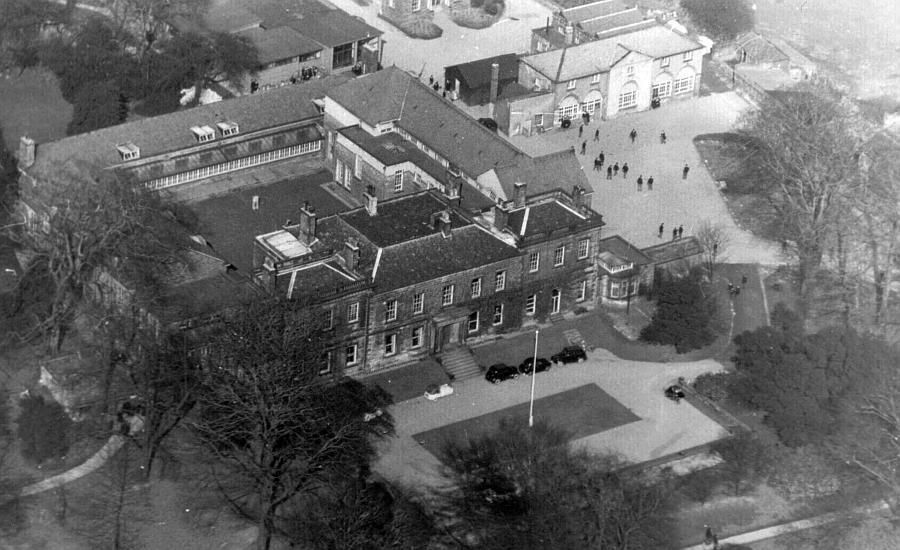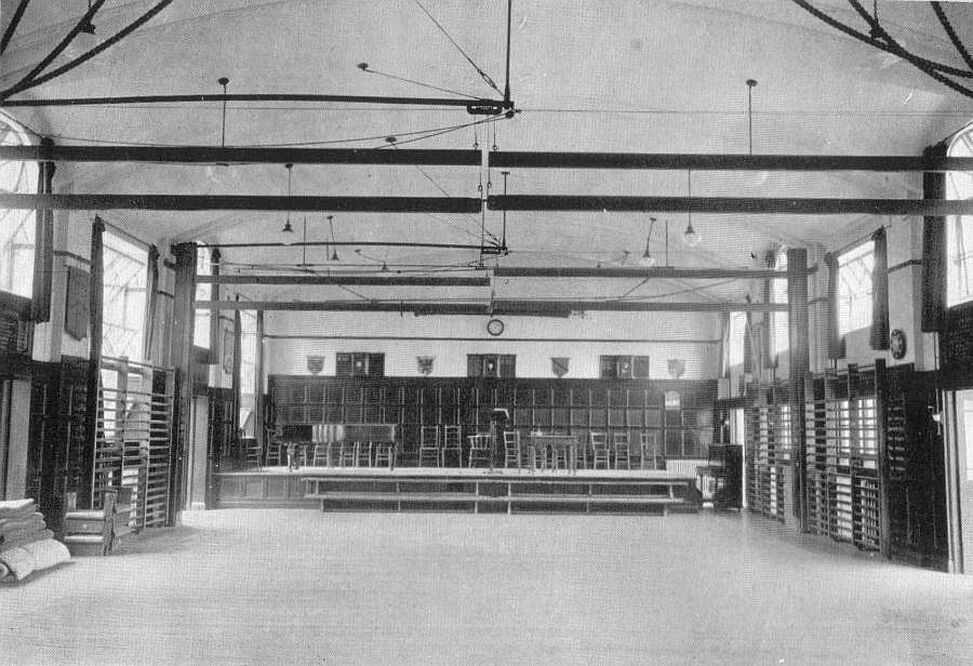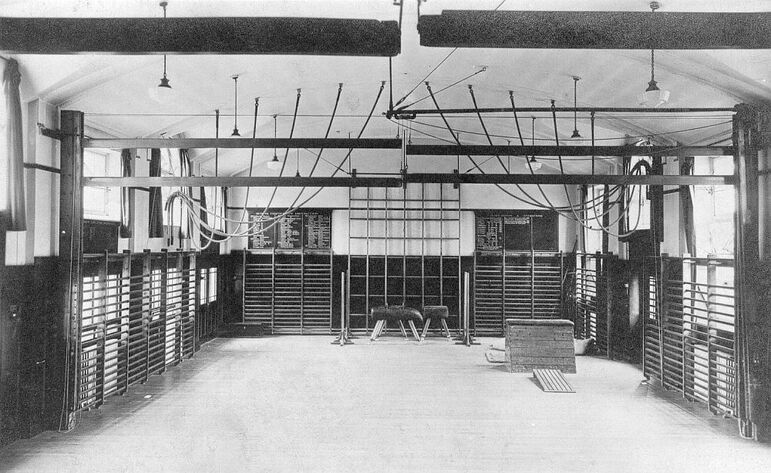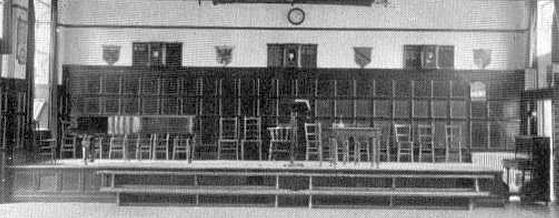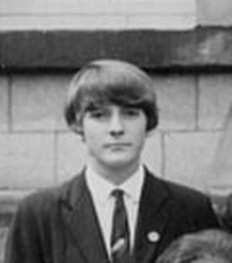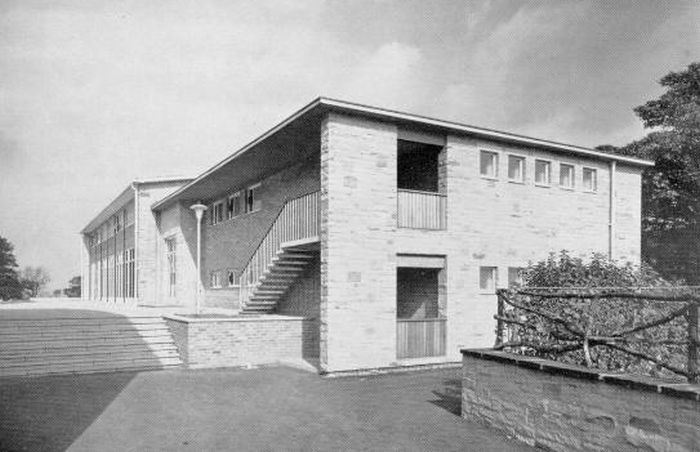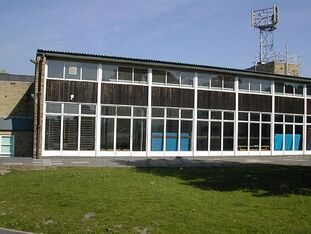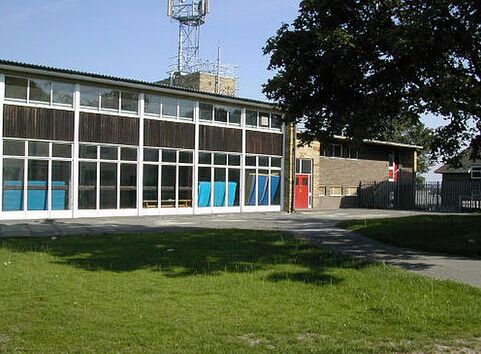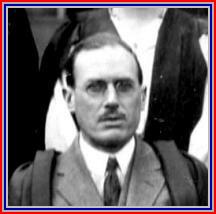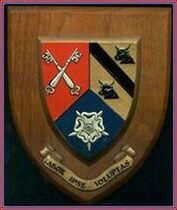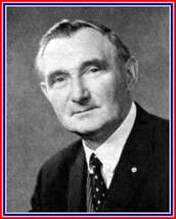Posts about HGS (6)
Updated 28.12.2023.
Updated 28.12.2023.
Mr Hamilton, in the Domestic Science Room, prepares to take part in the Staff play.
Photo: Batey
Photo: Batey
|
Table of Contents
1. Why have a House system? 2. 1967 and Food for thought? 3. The HGS Staff 1 - The Senior Mistresses 4. Random Reflections from 1944-51 5. Memories from Pat |
6. General Science 1955-59
7. A wet lunchtime activity 8. The last singing of the School Song revisited |
1. Why have a House system?
Guest - Holgate - Price - Talbot
Guest, Holgate, Price, Talbot? We were in one or other of them for the whole of our HGS careers. I think that of all the House reports I have typed, the 1950 set (see below) actually put into words what the House system was trying to achieve at HGS.
a. A good standard of behaviour in School.
b. A sense of “team spirit” within each House. Helping one another to achieve a desired outcome.
c. A “bonding” of certain member-teachers to the pupils within each House.
d. The inclusion of the many and varied talents of the pupils (music, sports, drama etc) to form a common goal - winning the Challenge Cup.
e. The realisation that whatever your behaviour in School, your quarter of the School’s population would either suffer the consequences of it, or share in its credit.
f. The knowledge that everything each pupil did in School was open to scrutiny by one’s peers and superiors, and encouragement or despair would be expressed.
g. The openly expressed belief that competition would drive up standards.
Have I missed anything?
Sheila
a. A good standard of behaviour in School.
b. A sense of “team spirit” within each House. Helping one another to achieve a desired outcome.
c. A “bonding” of certain member-teachers to the pupils within each House.
d. The inclusion of the many and varied talents of the pupils (music, sports, drama etc) to form a common goal - winning the Challenge Cup.
e. The realisation that whatever your behaviour in School, your quarter of the School’s population would either suffer the consequences of it, or share in its credit.
f. The knowledge that everything each pupil did in School was open to scrutiny by one’s peers and superiors, and encouragement or despair would be expressed.
g. The openly expressed belief that competition would drive up standards.
Have I missed anything?
Sheila
The Final House Competition Standings from the available results when the school closed in 1967.
Notes from the House Captains 1950
Guest
As we are only at the end of the second term, we have not very much idea what our final position will be, but so far we have done quite well. Last term we were first in stars and stripes which made a pleasant change. This term we are third in hockey, first in netball and second in the cross-country run. We appear to have done quite well in the Music Competition too, and then there is the Junior Play to come. We would like to wish everyone luck in cricket, tennis and rounders matches. The main thing to remember is that everything counts, whether you do it in School or on the games field, so everyone must work hard again in the summer term.
The thanks of the House are due to Miss Harris, Miss Carter, Miss Metcalfe, Mr. Jones, Mr. Farrar, Mr. Allan, Mr. Burnett and Mr. Combs for their help and encouragement in all our activities.
Marie Allen U6A, Duncan Perry U6S
As we are only at the end of the second term, we have not very much idea what our final position will be, but so far we have done quite well. Last term we were first in stars and stripes which made a pleasant change. This term we are third in hockey, first in netball and second in the cross-country run. We appear to have done quite well in the Music Competition too, and then there is the Junior Play to come. We would like to wish everyone luck in cricket, tennis and rounders matches. The main thing to remember is that everything counts, whether you do it in School or on the games field, so everyone must work hard again in the summer term.
The thanks of the House are due to Miss Harris, Miss Carter, Miss Metcalfe, Mr. Jones, Mr. Farrar, Mr. Allan, Mr. Burnett and Mr. Combs for their help and encouragement in all our activities.
Marie Allen U6A, Duncan Perry U6S
Holgate
Although our prospects of doing really well this year did not seem very great, we have done much of which we can be proud. The hockey team has had a most successful season and has won the cup - well done! The Senior Rugby team did not come up to our expectations but, thanks to the Juniors, we managed to keep our head above water. Our final position was second. The netball team also reached this position. Unfortunately that ends the list of our achievements. Congratulations to the six gallant seniors who completed the cross-country course. We appreciate their courage. Apart from the successes mentioned, our progress this year has left much to be desired. There is still time to improve our position. Let us have more stars and fewer stripes next term, Holgate. The summer term is one in which Holgate usually shines. Quite a number of our cricketers have left but there are still enough with us to give our opponents a hard time. If the tennis team do as well as the hockey team, we shall be more than pleased - good luck to them. Athletics are usually our strong point. Do not let our reputation down, either before Sports Day, or on the Day itself.
Gladys Alderman U6A, Robinson J. U6S
Although our prospects of doing really well this year did not seem very great, we have done much of which we can be proud. The hockey team has had a most successful season and has won the cup - well done! The Senior Rugby team did not come up to our expectations but, thanks to the Juniors, we managed to keep our head above water. Our final position was second. The netball team also reached this position. Unfortunately that ends the list of our achievements. Congratulations to the six gallant seniors who completed the cross-country course. We appreciate their courage. Apart from the successes mentioned, our progress this year has left much to be desired. There is still time to improve our position. Let us have more stars and fewer stripes next term, Holgate. The summer term is one in which Holgate usually shines. Quite a number of our cricketers have left but there are still enough with us to give our opponents a hard time. If the tennis team do as well as the hockey team, we shall be more than pleased - good luck to them. Athletics are usually our strong point. Do not let our reputation down, either before Sports Day, or on the Day itself.
Gladys Alderman U6A, Robinson J. U6S
Price
We have not done well enough so far this year. We have only managed to gain second place in rugger and cross-country, and third in netball. In hockey the girls have won two matches out of five. Credit here must go to the Juniors who have won both their matches. The Seniors, it must be said, have disappointed us but we know (or we hope) they have done their best. Stripes have been kept down this year but co-operation is still needed from a handful of stripe-gatherers. Can these people take note that two of last term's worst offenders have made a marvellous recovery and now lead the way in star-gathering? The approach of the Summer term opens yet another field for the talents of Price House sportsmen and Sportswomen, and it is in these spheres that we hope we shall excel. Scholastic efforts must not be overlooked in the forthcoming term. We wish all Price House S.C. (School Certificate) and H.S.C. (Higher School Cert.) candidates the best of luck. It is also up to Price House pupils to try and keep in the top half of the form in ordinary schoolwork. In past years we have been very lucky in possessing outstanding individuals to bring honours to Price House, but this year, lacking such people, we must endeavour to pull together. Remember, Price, every point helps towards the blue ribbon being placed around the Challenge Cup for yet another year.
This year we have already welcomed Miss Whitworth and Mr. Haynes to Price House, and we should like to thank them, together with Miss Wimpenny, Mr. Manning, Mr. Johnson and Mr. Stockhill, for their untiring help and encouragement throughout the year. We regret that Mr. Johnson and Mr. Haynes will be leaving us at the end of the year, but we wish them every success in their new posts.
Maureen Sale L6A, William Littleboy L6S
We have not done well enough so far this year. We have only managed to gain second place in rugger and cross-country, and third in netball. In hockey the girls have won two matches out of five. Credit here must go to the Juniors who have won both their matches. The Seniors, it must be said, have disappointed us but we know (or we hope) they have done their best. Stripes have been kept down this year but co-operation is still needed from a handful of stripe-gatherers. Can these people take note that two of last term's worst offenders have made a marvellous recovery and now lead the way in star-gathering? The approach of the Summer term opens yet another field for the talents of Price House sportsmen and Sportswomen, and it is in these spheres that we hope we shall excel. Scholastic efforts must not be overlooked in the forthcoming term. We wish all Price House S.C. (School Certificate) and H.S.C. (Higher School Cert.) candidates the best of luck. It is also up to Price House pupils to try and keep in the top half of the form in ordinary schoolwork. In past years we have been very lucky in possessing outstanding individuals to bring honours to Price House, but this year, lacking such people, we must endeavour to pull together. Remember, Price, every point helps towards the blue ribbon being placed around the Challenge Cup for yet another year.
This year we have already welcomed Miss Whitworth and Mr. Haynes to Price House, and we should like to thank them, together with Miss Wimpenny, Mr. Manning, Mr. Johnson and Mr. Stockhill, for their untiring help and encouragement throughout the year. We regret that Mr. Johnson and Mr. Haynes will be leaving us at the end of the year, but we wish them every success in their new posts.
Maureen Sale L6A, William Littleboy L6S
Talbot
Once more we are coming to the end of a School year which has been on the whole, quite successful. The matter of stars and stripes still needs watching, although we can report a distinct improvement this term. On the Sports field there have been both successes and disappointments. The boys in particular have done very well indeed, winning both the Rugby Cup and the Cross-Country - both results of team spirit. The girls had hard luck as regards the Hockey Cup, but no comment is necessary on the netball results. Bright hopes are entertained for next year's attractions, namely cricket, tennis, rounders, Sports Day and the Swimming Gala, and we feel sure Talbot will feature prominently in most, if not all of them.
Special mention must be made of Mr. Storer, who, after twenty-six most valuable years of service both to the House and the School is unfortunately leaving us. We feel sure that past and present members of Talbot House wish him much happiness in his well-earned retirement. We regret, too, the transfer of Miss Whitworth to Price House and feel sure they have made a very good acquisition. Our thanks are also due to Miss Horsefield, Miss Jackson, Mrs. Copley, Mr. Atack, Mr. Foy, Mr. Swinbank (especially for his Rugby advice) and Mr. Owen for the unfailing support and encouragement they have given us throughout the year.
Joyce Dixon U6A, Brian Lawton B. U6A
Once more we are coming to the end of a School year which has been on the whole, quite successful. The matter of stars and stripes still needs watching, although we can report a distinct improvement this term. On the Sports field there have been both successes and disappointments. The boys in particular have done very well indeed, winning both the Rugby Cup and the Cross-Country - both results of team spirit. The girls had hard luck as regards the Hockey Cup, but no comment is necessary on the netball results. Bright hopes are entertained for next year's attractions, namely cricket, tennis, rounders, Sports Day and the Swimming Gala, and we feel sure Talbot will feature prominently in most, if not all of them.
Special mention must be made of Mr. Storer, who, after twenty-six most valuable years of service both to the House and the School is unfortunately leaving us. We feel sure that past and present members of Talbot House wish him much happiness in his well-earned retirement. We regret, too, the transfer of Miss Whitworth to Price House and feel sure they have made a very good acquisition. Our thanks are also due to Miss Horsefield, Miss Jackson, Mrs. Copley, Mr. Atack, Mr. Foy, Mr. Swinbank (especially for his Rugby advice) and Mr. Owen for the unfailing support and encouragement they have given us throughout the year.
Joyce Dixon U6A, Brian Lawton B. U6A
These words of encoragement were intended to boost the performance of members of the Houses. Each year, the pupil who had performed really well was given the House Merit Award. Below are the pupils who received the award in the more recent years. The range of activities was quite wide and designed to involve as many pupils as possible at the House level. The next level up, of course, was the school level. That was more difficult to achieve, but certainly a desirable goal. In some sports, it was possible to go beyond the school level and represent the local region, County, North of England or even higher. Support from the school was always there.
Dave
Dave
The winners of the Annual House Merit Award for School Years 1 to 4.
1963 to 1967
1963 to 1967
Guest - Holgate - Price - Talbot
2. 1967 and Food for thought?
This year, perhaps above all others, has been a year of change. There have been years when more members of staff have left us but there can have been few when we have felt so great a sense of loss. Miss Alliot left us and moved to Scotland, Mr. Hudson moved to York and after many years of faithful service Miss. Blake retired. They all worked tirelessly for school and will be missed by us all. We are, however, happy to welcome to the school Miss. Jackson, Mlle. Béraud, Mr. Waters, Mr. Owens and Mr. Walsh. We offer too our congratulations to Mr. and Mrs. Plummer on their marriage during this year.
|
Miss Jackson
|
Mr and Mrs Plummer
|
Of course, the greatest change and one that is causing some anxiety among us, is the re-organisation of the school. Although we are not yet comprehensive the adaptation of the premises, for a comprehensive intake is very much in evidence. The grounds have been ripped, holes torn in walls and outbuildings razed to the ground. No one, however progressive, can see the demolition of trees and the smashing of old stone without some sense of sadness, and it is hard to accept progress as something good when it manifests itself in the destruction of beauty. For many pupils, past and present, the grounds of this school have been a place of quiet and peace. They have exercised an influence over us, and have become part of us. It seems a poor exchange when all we are likely to have in their place is cold, streamlined concrete and glass.
With the destruction of the grounds our identity will pass. Our pupils must learn allegiance to another school and our old scholars will have lost a link with the past. It seems that we are old and must make way for a new world - we are obsolete.
Even so, we may regret and question our passing. The nation-wide re-organisation of secondary education is not simply a matter of education. Its educational advantages are unproven and therefore open to doubt. It is perhaps more clearly to be understood as one small part of a much wider revolution, an attempt to level society, to make sure that all men share as equally as possible the benefits and opportunities available.
That all men should be fellows is clearly a laudable aim and it is morally right. If this re-organisation can make our future generations more at one than they have been in the past and if it can make education more effective and democratic, then it will have been justified. Even so, it smacks of a gamble and the stakes are high.
The desire for equality, which is the deep motive of comprehensive education, is a strange and dangerous virtue. If a man of wealth volunteers to give up his riches for the good of others, his action is noble and selfless - he gains a kind of dignity from it. It is quite another matter for a man who has nothing to claim as his right the property of his neighbour - he may produce his philosophical arguments but he is known for a thief. To desire equality is not of itself a virtue; that can only be determined by the motive.
Equality has been called for and has of political necessity been granted. It is now for those who have made this claim to consider their motives. Is their equality a sharing of their child's opportunity with their neighbours' children, or is it the jealous destruction of a system in which their neighbours' children merited and achieved success?
In all this one thing is certain - that Hemsworth Grammar School will cease to exist and a great many people will be the sadder for it.
Editorial Committee
With the destruction of the grounds our identity will pass. Our pupils must learn allegiance to another school and our old scholars will have lost a link with the past. It seems that we are old and must make way for a new world - we are obsolete.
Even so, we may regret and question our passing. The nation-wide re-organisation of secondary education is not simply a matter of education. Its educational advantages are unproven and therefore open to doubt. It is perhaps more clearly to be understood as one small part of a much wider revolution, an attempt to level society, to make sure that all men share as equally as possible the benefits and opportunities available.
That all men should be fellows is clearly a laudable aim and it is morally right. If this re-organisation can make our future generations more at one than they have been in the past and if it can make education more effective and democratic, then it will have been justified. Even so, it smacks of a gamble and the stakes are high.
The desire for equality, which is the deep motive of comprehensive education, is a strange and dangerous virtue. If a man of wealth volunteers to give up his riches for the good of others, his action is noble and selfless - he gains a kind of dignity from it. It is quite another matter for a man who has nothing to claim as his right the property of his neighbour - he may produce his philosophical arguments but he is known for a thief. To desire equality is not of itself a virtue; that can only be determined by the motive.
Equality has been called for and has of political necessity been granted. It is now for those who have made this claim to consider their motives. Is their equality a sharing of their child's opportunity with their neighbours' children, or is it the jealous destruction of a system in which their neighbours' children merited and achieved success?
In all this one thing is certain - that Hemsworth Grammar School will cease to exist and a great many people will be the sadder for it.
Editorial Committee
Comment

Melvyn Thomas
I for one, would say the experiment has produced an increasing failure. Decades of decay, good stone and brick buildings replaced by, effectively, warehousing. A steel frame clad to whatever is required at that time, hence ensuring that there will never be, continuity. Perhaps that was the purpose all along, people trained to achieve a certain level and no further. Am I being too pessimistic? I hope so I really do.
I for one, would say the experiment has produced an increasing failure. Decades of decay, good stone and brick buildings replaced by, effectively, warehousing. A steel frame clad to whatever is required at that time, hence ensuring that there will never be, continuity. Perhaps that was the purpose all along, people trained to achieve a certain level and no further. Am I being too pessimistic? I hope so I really do.
3. The HGS Staff 1 - The Senior Mistresses
HGS Senior Staff
Before I started putting the HGS website together in 2001, I thought that Staff changes had been relatively few. How wrong I was! This point is covered in the HGS Staff Section. At the Senior Staff level we all know about the two Headmasters. Senior Staff changes were very few in number. The ladies shown below covered the 46 years of the School's life.
Before I started putting the HGS website together in 2001, I thought that Staff changes had been relatively few. How wrong I was! This point is covered in the HGS Staff Section. At the Senior Staff level we all know about the two Headmasters. Senior Staff changes were very few in number. The ladies shown below covered the 46 years of the School's life.
Comment
Miss Griffiths was the first Senior Mistress. She was followed by Miss Shortridge. The latter left in April 1946 and Miss Smith took up her position in September 1946. For the Summer Term 1946, Miss Prince (History and Geography) was the Senior Mistress. I assume this was to cover what was to be the final change over. As pupils, I think we all knew and respected Miss Smith.
Dave
Miss Griffiths was the first Senior Mistress. She was followed by Miss Shortridge. The latter left in April 1946 and Miss Smith took up her position in September 1946. For the Summer Term 1946, Miss Prince (History and Geography) was the Senior Mistress. I assume this was to cover what was to be the final change over. As pupils, I think we all knew and respected Miss Smith.
Dave
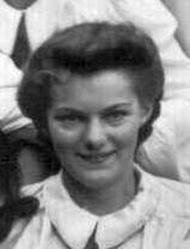
Insight from Jean Burton
Dear Dave,
Miss Shortridge was Senior Mistress from my second year until I left. Her predecessor was Miss Griffiths, a tall, white haired distinguished lady with (what seemed to a nervous first year) very piercing eyes. In my first week she came into a cookery class, walked slowly round and scrutinised each one of us. Stopping in front of me, she demanded to know why I wasn’t wearing the regulation school blouse, which was a pale tan colour. I remember stammering out ‘Please miss, my mother didn’t know there was one’ - which was perfectly true. We had been given no information whatsoever as to what was required and didn’t know anyone else who was at the school. What a difference compared to the induction procedures of the present day! Miss Griffiths must have been responsible for the voluminous knickers/shorts that the girls had to wear for all P.E. and sports activities. They draped down in huge folds - presumably to preserve decency! They soon disappeared when Miss Griffiths retired.
Miss Shortridge was short in build as well as name, was very brisk and efficient and a good disciplinarian. I can still hear the ‘click clack’ of her heels as she bustled to and fro from her office to the staffroom which was next door. She taught French and I can remember the first lesson of one new year when we all held our breath as we heard approaching footsteps, dreading to see who was going to be the teacher! My recollections are that she was a good teacher. During our second year in the Upper Sixth most of my colleagues were busy applying for teacher training colleges and going for interviews. I couldn’t because I was too young to go, even though the Government had lowered the age for admission because of shortages. One day, Miss Shortridge called me to her office and said that I could go after all because the age limit had been lowered still further. I blurted out that I hadn’t had any interviews and she smiled and said that wouldn’t matter, so off I went to Leeds Training College, which was housed in hotels in Scarborough as the Headingley College had been taken over for military purposes. So, at nineteen and a half I started my first post as a qualified teacher!
Miss Prince taught History. She can be seen on the photo of the teaching staff of 1946, front row at No. 4 - next to the Head. Connecting that with a comment from someone else, that was probably when she was acting Senior Mistress when Miss Shortridge left in April.
Jean Burton, HGS 1936-43
Dear Dave,
Miss Shortridge was Senior Mistress from my second year until I left. Her predecessor was Miss Griffiths, a tall, white haired distinguished lady with (what seemed to a nervous first year) very piercing eyes. In my first week she came into a cookery class, walked slowly round and scrutinised each one of us. Stopping in front of me, she demanded to know why I wasn’t wearing the regulation school blouse, which was a pale tan colour. I remember stammering out ‘Please miss, my mother didn’t know there was one’ - which was perfectly true. We had been given no information whatsoever as to what was required and didn’t know anyone else who was at the school. What a difference compared to the induction procedures of the present day! Miss Griffiths must have been responsible for the voluminous knickers/shorts that the girls had to wear for all P.E. and sports activities. They draped down in huge folds - presumably to preserve decency! They soon disappeared when Miss Griffiths retired.
Miss Shortridge was short in build as well as name, was very brisk and efficient and a good disciplinarian. I can still hear the ‘click clack’ of her heels as she bustled to and fro from her office to the staffroom which was next door. She taught French and I can remember the first lesson of one new year when we all held our breath as we heard approaching footsteps, dreading to see who was going to be the teacher! My recollections are that she was a good teacher. During our second year in the Upper Sixth most of my colleagues were busy applying for teacher training colleges and going for interviews. I couldn’t because I was too young to go, even though the Government had lowered the age for admission because of shortages. One day, Miss Shortridge called me to her office and said that I could go after all because the age limit had been lowered still further. I blurted out that I hadn’t had any interviews and she smiled and said that wouldn’t matter, so off I went to Leeds Training College, which was housed in hotels in Scarborough as the Headingley College had been taken over for military purposes. So, at nineteen and a half I started my first post as a qualified teacher!
Miss Prince taught History. She can be seen on the photo of the teaching staff of 1946, front row at No. 4 - next to the Head. Connecting that with a comment from someone else, that was probably when she was acting Senior Mistress when Miss Shortridge left in April.
Jean Burton, HGS 1936-43
A point to consider
In the early 1930's a number of countries including the UK, USA and Germany, responded to the current high level of male unemployment by introducing legislation to remove married women from the workforce or to deter them from entering it.
It was thought that if married women brought a second wage into the household, then that denied others their opportunity to earn. The status of women teachers was under discussion in Yorkshire in the early part of 1934, when great opposition to the employment of married women teachers came from their male colleagues and school Governors. Resignation was required upon marriage due to the long-standing general view that a married woman's 'place' was in the home, raising her family. It was similarly out of the question that women with young children should be employed in schools.
Since the opening of Hemsworth Secondary School in 1921, the termination of the employment of many women teachers at Hemsworth had taken place and been accepted as automatic when they married. Indeed, in January 1934 the West Riding Education Committee felt moved to create a report on the matter, which stated that, "the employment of women teachers is unwise on educational grounds, and prevents a due succession of women teachers." Even though it was admitted that the dismissal of all such teachers "might result in cases of hardship...." and that, therefore, each case should be reviewed on its merits. Nevertheless, the review, of the predominantly male members of the Education Committee, decided to assess the appointments of all married women teachers annually.
One of the members of the Education Committee at that time, and with strong views on the employment of women teachers, was Lady Mabel Florence Harriet Wentworth-Fitzwilliam (1870-1951). Her father was William Wentworth Fitzwilliam, Viscount Milton, the eldest son of William Wentworth-Fitzwilliam, 6th Earl Fitzwilliam. Her father died before inheriting the Earldom and it passed to her brother, William Wentworth. Contrary to her privileged background she was a socialist politician, known as Lady Mabel Smith after her marriage in 1899. She was a West Riding County Councillor and later a county Alderman, and a member of the Workers' Education Authority. In 1932 and 1934 she served on the Labour Party National Executive Committee. As a Christian and a social worker, she said that her social conscience had developed after seeing the conditions of children living on the Wentworth estate, which was her ancestral home.
In the Education Authority's debate, Lady Mabel stated that as an educationalist of some years' standing, she had never yet seen any proof that a woman became a worse teacher because of getting married. The matter should be viewed from one standpoint only - that of the child in the school. What did the Committee mean by "hardship"? As an education committee, it was their duty to find the best possible teachers for the children, and if it could be proved that there was hardship to the children, then that teacher should be removed, not otherwise. While she would do anything she could to help any teacher, married or otherwise, who was in difficulties, it was not the function of an educational authority to take personal hardship into consideration. She thought they had long ago ceased to say "A woman's place is in the home."
In the early 1930's a number of countries including the UK, USA and Germany, responded to the current high level of male unemployment by introducing legislation to remove married women from the workforce or to deter them from entering it.
It was thought that if married women brought a second wage into the household, then that denied others their opportunity to earn. The status of women teachers was under discussion in Yorkshire in the early part of 1934, when great opposition to the employment of married women teachers came from their male colleagues and school Governors. Resignation was required upon marriage due to the long-standing general view that a married woman's 'place' was in the home, raising her family. It was similarly out of the question that women with young children should be employed in schools.
Since the opening of Hemsworth Secondary School in 1921, the termination of the employment of many women teachers at Hemsworth had taken place and been accepted as automatic when they married. Indeed, in January 1934 the West Riding Education Committee felt moved to create a report on the matter, which stated that, "the employment of women teachers is unwise on educational grounds, and prevents a due succession of women teachers." Even though it was admitted that the dismissal of all such teachers "might result in cases of hardship...." and that, therefore, each case should be reviewed on its merits. Nevertheless, the review, of the predominantly male members of the Education Committee, decided to assess the appointments of all married women teachers annually.
One of the members of the Education Committee at that time, and with strong views on the employment of women teachers, was Lady Mabel Florence Harriet Wentworth-Fitzwilliam (1870-1951). Her father was William Wentworth Fitzwilliam, Viscount Milton, the eldest son of William Wentworth-Fitzwilliam, 6th Earl Fitzwilliam. Her father died before inheriting the Earldom and it passed to her brother, William Wentworth. Contrary to her privileged background she was a socialist politician, known as Lady Mabel Smith after her marriage in 1899. She was a West Riding County Councillor and later a county Alderman, and a member of the Workers' Education Authority. In 1932 and 1934 she served on the Labour Party National Executive Committee. As a Christian and a social worker, she said that her social conscience had developed after seeing the conditions of children living on the Wentworth estate, which was her ancestral home.
In the Education Authority's debate, Lady Mabel stated that as an educationalist of some years' standing, she had never yet seen any proof that a woman became a worse teacher because of getting married. The matter should be viewed from one standpoint only - that of the child in the school. What did the Committee mean by "hardship"? As an education committee, it was their duty to find the best possible teachers for the children, and if it could be proved that there was hardship to the children, then that teacher should be removed, not otherwise. While she would do anything she could to help any teacher, married or otherwise, who was in difficulties, it was not the function of an educational authority to take personal hardship into consideration. She thought they had long ago ceased to say "A woman's place is in the home."
The HGS Teaching Staff 1939-40
Back Row L-R: Miss Walker, Miss Garman, Mr. Waters, Mr. Scourfield, Mr. Austin, Mr. Storer, Mr. Hyde, Mr. Nelson
Middle Row L-R: Miss Harrison, Miss Bromley, Miss Prince, Miss Shortridge, Mr. Hamilton, Mr. Crossland, Mr. Manning, Mr. Collette, Mr. Hamilton (Art)
Front Row L-R: 1, Miss Kenward, Miss. Euler, 4, 5, Miss Townsend
Middle Row L-R: Miss Harrison, Miss Bromley, Miss Prince, Miss Shortridge, Mr. Hamilton, Mr. Crossland, Mr. Manning, Mr. Collette, Mr. Hamilton (Art)
Front Row L-R: 1, Miss Kenward, Miss. Euler, 4, 5, Miss Townsend
4. Random Reflections from 1944-51
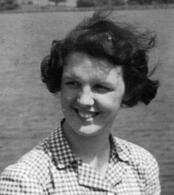
1. 1951
Nearly the whole school went on the chartered train to London to see the “Festival of Britain” site.
2. Crates of Apples
These came from either the USA or Canada during wartime.
3. Morning Assembly
Anyone who had disgraced the school was made to stand in front of the First Formers at the front of the Hall so the that whole school could see them.
4. School Reports
These were in book form (I have still got mine). Parent had to sign it before you returned to school just to prove he/she had read it.
5. Ship’s Pennant
This hung opposite the Head’s Study. Was it HMS Esperance?
6. Speech Days
These were held in the Hemsworth Hippodrome. All the staff wore graduation gowns and hoods. The colours were beautiful.
Nearly the whole school went on the chartered train to London to see the “Festival of Britain” site.
2. Crates of Apples
These came from either the USA or Canada during wartime.
3. Morning Assembly
Anyone who had disgraced the school was made to stand in front of the First Formers at the front of the Hall so the that whole school could see them.
4. School Reports
These were in book form (I have still got mine). Parent had to sign it before you returned to school just to prove he/she had read it.
5. Ship’s Pennant
This hung opposite the Head’s Study. Was it HMS Esperance?
6. Speech Days
These were held in the Hemsworth Hippodrome. All the staff wore graduation gowns and hoods. The colours were beautiful.
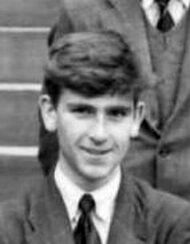
I do not remember walking to the Hippodrome from school. I seem to remember we either had the day or afternoon off and went from and to home - but I could be wrong. At the Speech Day ceremony the pupils were down stairs with the juniors in front and the rest in order with the seniors at the back. The staff, parents and guests were upstairs on the balcony. The pupils receiving prizes assembled to the left of the stage and were organized by Mr Leonard and Mr Collette.
Terry O’Marr
7. Stars and Stripes
There was a large board at the foot of the Main Staircase.
8. The Statue in the Quadrangle
Wendy. This was decorated with the pants of Senior Boys on the last day of the school year. One year some boys who were leaving raising the fire alarm and had the whole school outside.
9. The Tech.
This was at the bottom of the Main Drive and was used as an extra-classroom. We had to wait outside sometimes in the snow or rain until the master or mistress came.
10. The Walk from the Green Gate
The walk from the Green Gate up to school was wonderful. As seasons came and went one saw lots of flowers under the trees.
Above were the noisy rooks. Was anyone dive-bombed by them? Who remembers the Japanese Tulip tree overhanging the Car Park wall? Sometimes the scene was enhanced by the sound from St. Helen’s Church letting us know the time.
11. Winter Lunch Breaks
All out on the playing fields all the year round including when it had been snowing.
We had some great snowball fights!
12. Exercise and scrap (rough) books.
Queuing up at stationery cupboards at set times to exchange full books on a one for one basis.
Terry O’Marr
7. Stars and Stripes
There was a large board at the foot of the Main Staircase.
8. The Statue in the Quadrangle
Wendy. This was decorated with the pants of Senior Boys on the last day of the school year. One year some boys who were leaving raising the fire alarm and had the whole school outside.
9. The Tech.
This was at the bottom of the Main Drive and was used as an extra-classroom. We had to wait outside sometimes in the snow or rain until the master or mistress came.
10. The Walk from the Green Gate
The walk from the Green Gate up to school was wonderful. As seasons came and went one saw lots of flowers under the trees.
Above were the noisy rooks. Was anyone dive-bombed by them? Who remembers the Japanese Tulip tree overhanging the Car Park wall? Sometimes the scene was enhanced by the sound from St. Helen’s Church letting us know the time.
11. Winter Lunch Breaks
All out on the playing fields all the year round including when it had been snowing.
We had some great snowball fights!
12. Exercise and scrap (rough) books.
Queuing up at stationery cupboards at set times to exchange full books on a one for one basis.
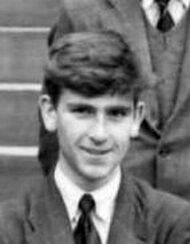
The stationery supply room was, as its name implies, used for stationery - mainly exercise books (I cannot remember whether there were other types of stationery). In my first few years this came under the jurisdiction of the senior physics master, Mr Storer. Stationery was available only at specific times, and when our exercise books were full we used to go along and Mr Storer would check them to see that no space was wasted and then mark the cover and either hand them back or discard them, depending on which was required, and issue a new one. Mr Storer used this room as his private office. There was just room for a small desk and chair, and he would sit there in his free periods and after school doing his marking. I cannot remember who took over this duty when he retired in 1949.
Terry O’Marr
Terry O’Marr
13. Staff.
Percy Crossland, Senior Master, adored and respected by the whole school. Mr (Daddy) Austin. Like a father figure, hence his
nickname.
Percy Crossland, Senior Master, adored and respected by the whole school. Mr (Daddy) Austin. Like a father figure, hence his
nickname.
14. Pigeon-holes.
We had to place homework there which had been set the previous day. The Senior school had 4 subjects a night.
15. Winter months.
Walking 5 miles to school and home again when the bus did not turn up. Many times in the snowy winter of 1947.
16. School choir.
Carol singing around Hemsworth always finishing up in Station Road at one of the Member of Staff’s houses and being invited in to be given hot drinks, mince pies and a warm before we went home.
17. Mock General elections held in School.
Great fun but quite a lot of hard canvassing went on and a little bullying.
18. Refreshments
When I was a senior girl, making lemonade in the Dom. Sc. room on Fridays ready for Home Cricket matches, and returning on Saturdays to serve it and watch the match on the beautiful playing fields.
Irene Wright, HGS 1944-51
We had to place homework there which had been set the previous day. The Senior school had 4 subjects a night.
15. Winter months.
Walking 5 miles to school and home again when the bus did not turn up. Many times in the snowy winter of 1947.
16. School choir.
Carol singing around Hemsworth always finishing up in Station Road at one of the Member of Staff’s houses and being invited in to be given hot drinks, mince pies and a warm before we went home.
17. Mock General elections held in School.
Great fun but quite a lot of hard canvassing went on and a little bullying.
18. Refreshments
When I was a senior girl, making lemonade in the Dom. Sc. room on Fridays ready for Home Cricket matches, and returning on Saturdays to serve it and watch the match on the beautiful playing fields.
Irene Wright, HGS 1944-51
5. Memories from Pat
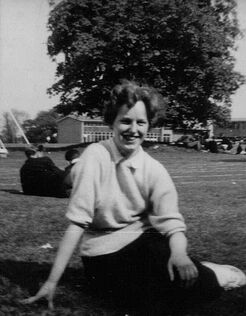
It is amazing how memories and names come flooding back. Here are a few from 1955-62:
a. The fear standing outside the Head’s Study waiting to walk with him along the corridor to the Hall when it was your turn to read the lesson in assembly.
b. We had the classroom (Room 1) opposite the Head’s study as our form room (2A) with the wooden desks, which we personalized with photos inside the lids.
c. I will always remember our final assembly in the Hall, singing the School Song with tears rolling down my face, knowing that this was the end of seven very special years.
d. Do you remember those dreaded lisle stockings (we must have been proto-types for Norah Batty) and the hats which we put a tuck in and then balanced precariously on the back of the head.
e. Do you remember the iced Sally Lunns which we got from Riggotts bakers in the village when we were allowed the privilege of going into the village at lunch-time when we made it into the Sixth Form?
f. Ackworth Quaker School used to be the favourite venue for hockey matches as they had hot showers followed by afternoon tea!
g. The highlight for the athletics had to be the Yorkshire Schools’ Championships at Redcar.
a. The fear standing outside the Head’s Study waiting to walk with him along the corridor to the Hall when it was your turn to read the lesson in assembly.
b. We had the classroom (Room 1) opposite the Head’s study as our form room (2A) with the wooden desks, which we personalized with photos inside the lids.
c. I will always remember our final assembly in the Hall, singing the School Song with tears rolling down my face, knowing that this was the end of seven very special years.
d. Do you remember those dreaded lisle stockings (we must have been proto-types for Norah Batty) and the hats which we put a tuck in and then balanced precariously on the back of the head.
e. Do you remember the iced Sally Lunns which we got from Riggotts bakers in the village when we were allowed the privilege of going into the village at lunch-time when we made it into the Sixth Form?
f. Ackworth Quaker School used to be the favourite venue for hockey matches as they had hot showers followed by afternoon tea!
g. The highlight for the athletics had to be the Yorkshire Schools’ Championships at Redcar.
Point a.
In assembly Prefects had to read out the Lesson of the Day from the Bible. They did this for one week. They stood at the Lectern and were followed by the Headmaster.
In assembly Prefects had to read out the Lesson of the Day from the Bible. They did this for one week. They stood at the Lectern and were followed by the Headmaster.
Below: The first three in the 1957 100 yards race on Sports Day.
The photo comes from Brenda Nettleton. Thank you.
L-R: Miss. Woodward (Mrs. Owen), Miss. Elliott (Mrs. Whittaker), Miss. Hampshire, Brenda Nettleton, Ellen Toulson, Pat Cockburn
Related Race Result: Inter. Girls: 100 Yards (Record B. Nettleton 1956, 12.2 secs)
1. Brenda Nettleton, 2. Ellen Toulson, 3. Pat Cockburn
Time: 12.4 secs
The photo comes from Brenda Nettleton. Thank you.
L-R: Miss. Woodward (Mrs. Owen), Miss. Elliott (Mrs. Whittaker), Miss. Hampshire, Brenda Nettleton, Ellen Toulson, Pat Cockburn
Related Race Result: Inter. Girls: 100 Yards (Record B. Nettleton 1956, 12.2 secs)
1. Brenda Nettleton, 2. Ellen Toulson, 3. Pat Cockburn
Time: 12.4 secs
Pat (Talbot House) with Mr Knox on Sports Day
Memories are never ending. Obviously I haven’t yet seen all the site-sections. The sight of seeing myself in pigtails certainly made me wonder “What Next?!” I cannot wait to discover more. Thank you for all your work, it’s brilliant. I will keep in touch.
Pat Cockburn, HGS 1955-62
Pat Cockburn, HGS 1955-62
6. General Science 1955-59
The Science Block
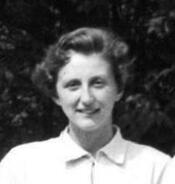
None of the 11year olds who came as First - Formers to HGS had ever taken “Science” as a separate subject, much less had a special room with equipment in it for the lessons! In 1955 the Science Room was situated next to the Domestic Science room, and overlooked the Dell. It contained long benches with Bunsen Burners spaced along them. There were charts on the walls - one of a huge eyeball, and another with the table of elements written out. Mr. Farrar was our teacher for the 1st and 2nd years, and he stood behind a desk or bench on a raised plinth in front of a blackboard. If you can picture yourself seated at a bench, you would have had the windows overlooking the Dell to your left, and the glass windows forming the side of the corridor to your right. Underneath these interior windows were the cupboards which contained the “apparatus”. For the mischievous, there was so much to fiddle with! Taps and tubes, tripods and thermometers! Everything was new to us, and fuelled conversations which must have tested the patience of the teacher.
The term “General” exactly describes the syllabus for the first two years of Science. As you can see from the Exam papers, elements of Chemistry, Physics and Biology were intermingled with opportunities to display common sense and observational skills. Tests of the memory came when we were asked as homework to reproduce diagrams from the experiments we did in class. I remember the care which had to be taken in the way one chose to describe the procedures of the experiments. Labels and conclusions drawn had to be precise and complete. Valuable life skills were being transmitted here. Litmus paper, crucibles, iron filings and prisms were new factors in our search for knowledge, and by the time we had reached the Third Form we had, one hoped, received the grounding which equipped us to cope with the separate subjects of Biology, Physics and Chemistry during that year. If we entered 4A, 4T or 4G one year later, we were back to General Science lessons, leaving the specialists to continue with the three separate subjects in 4S in the “new” Science Block. They dropped Latin (and maybe other subjects?) to leave room in their timetable for this. Our General Science fourth year contained the joys of photosynthesis, the production of Carbon Dioxide and the identification of elements, mixtures and compounds. The Nitrogen Cycle was there also, as was a thorough investigation of reflections, convex and concave mirrors, and that wonderful item - The Living Cell - with its nucleus, cell walls and - wait for it - cell vacuole! By the time 1960 had arrived, the Fifth Year were still in their Arts or Sciences streams. The 2 and a half-hour ‘Gensci’ Test Exam paper of that year gives an indication of the ground covered by the syllabus. It contains questions on light reflection/refraction; study of electric bells; specific gravity; conversion of energy; laboratory preparation of oxygen, hydrogen, carbon dioxide (again), and ammonia; and those elements, mixtures and compounds once more. Muscles, breathing and blood, together with bile, saliva and gastric juices were explained to us along with those famous lessons in the Lecture Theatre given by Mr. Knox on sexual reproduction and the creation of blushes! Which of us from that year does not remember the Amoeba and its pseudopodia, and the Spirogyra? What about Mr. Sale’s dissection of the frog? A question on the 1960 paper reads as follows: “When we live in a room, some means of ventilation is essential, but if space travel becomes possible, travellers will need some means of making the air fit for re-use by them. Describe how you think this could be done, giving the names of chemical substances and details of reactions involved”. Here is Science reflecting 1960’s life at the turn of that decade many years ago!
The term “General” exactly describes the syllabus for the first two years of Science. As you can see from the Exam papers, elements of Chemistry, Physics and Biology were intermingled with opportunities to display common sense and observational skills. Tests of the memory came when we were asked as homework to reproduce diagrams from the experiments we did in class. I remember the care which had to be taken in the way one chose to describe the procedures of the experiments. Labels and conclusions drawn had to be precise and complete. Valuable life skills were being transmitted here. Litmus paper, crucibles, iron filings and prisms were new factors in our search for knowledge, and by the time we had reached the Third Form we had, one hoped, received the grounding which equipped us to cope with the separate subjects of Biology, Physics and Chemistry during that year. If we entered 4A, 4T or 4G one year later, we were back to General Science lessons, leaving the specialists to continue with the three separate subjects in 4S in the “new” Science Block. They dropped Latin (and maybe other subjects?) to leave room in their timetable for this. Our General Science fourth year contained the joys of photosynthesis, the production of Carbon Dioxide and the identification of elements, mixtures and compounds. The Nitrogen Cycle was there also, as was a thorough investigation of reflections, convex and concave mirrors, and that wonderful item - The Living Cell - with its nucleus, cell walls and - wait for it - cell vacuole! By the time 1960 had arrived, the Fifth Year were still in their Arts or Sciences streams. The 2 and a half-hour ‘Gensci’ Test Exam paper of that year gives an indication of the ground covered by the syllabus. It contains questions on light reflection/refraction; study of electric bells; specific gravity; conversion of energy; laboratory preparation of oxygen, hydrogen, carbon dioxide (again), and ammonia; and those elements, mixtures and compounds once more. Muscles, breathing and blood, together with bile, saliva and gastric juices were explained to us along with those famous lessons in the Lecture Theatre given by Mr. Knox on sexual reproduction and the creation of blushes! Which of us from that year does not remember the Amoeba and its pseudopodia, and the Spirogyra? What about Mr. Sale’s dissection of the frog? A question on the 1960 paper reads as follows: “When we live in a room, some means of ventilation is essential, but if space travel becomes possible, travellers will need some means of making the air fit for re-use by them. Describe how you think this could be done, giving the names of chemical substances and details of reactions involved”. Here is Science reflecting 1960’s life at the turn of that decade many years ago!
Who taught Sheils's Forms?
1955-56: 1st year (1B), General Science, Mr Farrar - Top Corridor Room
1956-57: 2nd year (2B), General Science, Mr Farrar - Top Corridor Room
1957-58: 3rd year (3A), Biology, Mr Sale, Chemistry, Mr. Taylor, Physics Mr. Woodcock
1958-59: 4th year (4A, 4T, 4G), General Science, Mr Knox
1959-60: 5th year (5A, 5T, 5G), General Science, Mr Sale and Mr Knox
Sheila
1955-56: 1st year (1B), General Science, Mr Farrar - Top Corridor Room
1956-57: 2nd year (2B), General Science, Mr Farrar - Top Corridor Room
1957-58: 3rd year (3A), Biology, Mr Sale, Chemistry, Mr. Taylor, Physics Mr. Woodcock
1958-59: 4th year (4A, 4T, 4G), General Science, Mr Knox
1959-60: 5th year (5A, 5T, 5G), General Science, Mr Sale and Mr Knox
Sheila
Comment
Below is the Second Forms' actual examination paper which we sat in the Summer of 1957. Your report book may have your result as a percentage. Your exam position in the form/class may also be stated. Knowledge and some Comprehension/Understanding were expected in the answers. Perhaps the better your displayed understanding of the topic, the higher your mark would be. Forms were streamed, so the higher your mark the better would be your chance of moving to a higher form, if possible, for the next school year. General Science was replaced by the three separate Sciences of Biology, Chemistry and Physics in 3A. This could lead to a move to 4S (Science) in the Fourth Form. An example of this possible movement to 4S is shown below.
Dave
Below is the Second Forms' actual examination paper which we sat in the Summer of 1957. Your report book may have your result as a percentage. Your exam position in the form/class may also be stated. Knowledge and some Comprehension/Understanding were expected in the answers. Perhaps the better your displayed understanding of the topic, the higher your mark would be. Forms were streamed, so the higher your mark the better would be your chance of moving to a higher form, if possible, for the next school year. General Science was replaced by the three separate Sciences of Biology, Chemistry and Physics in 3A. This could lead to a move to 4S (Science) in the Fourth Form. An example of this possible movement to 4S is shown below.
Dave
4S 1958-59
Photo contributed by Jean Hardcastle and Jean Tallett. Thank you.
Back Row L-R: Ian Townsend, John Turner, David Hartley, Peter Kaye, Tony Hince, Dave McKenzie, Michael Harrison
Third Row L-R: Brian Lees, Michael Willson, Len Linsey, Bob Taylor, Albert Parkin, Michael Dixon, Godfrey Wass
Second Row L-R: Nev Mozley, Wray Vamplew, John Colley, Eddie Pickles, Ronnie Holland, Neil Whalley, Don Brett
Front Row L-R: Audrey Lynch, Jean Hardcastle, Jean Tallett, Mr. Woodcock, Brian May, Alan Barker, Keith Gainey
The Form Prize was awarded to Godfrey Wass.
Back Row L-R: Ian Townsend, John Turner, David Hartley, Peter Kaye, Tony Hince, Dave McKenzie, Michael Harrison
Third Row L-R: Brian Lees, Michael Willson, Len Linsey, Bob Taylor, Albert Parkin, Michael Dixon, Godfrey Wass
Second Row L-R: Nev Mozley, Wray Vamplew, John Colley, Eddie Pickles, Ronnie Holland, Neil Whalley, Don Brett
Front Row L-R: Audrey Lynch, Jean Hardcastle, Jean Tallett, Mr. Woodcock, Brian May, Alan Barker, Keith Gainey
The Form Prize was awarded to Godfrey Wass.
7. A wet lunchtime activity
Sheila
At HGS, what did you do at break or lunchtime when it was raining? Wet lunchtimes evoke musical memories such as Cliff Richard's 'Living Doll', Buddy Holly's "Peggy Sue" and Glen Miller's "American Patrol". The latter was our only quickstep record, and therefore played endlessly. As First and Second formers we stood around the edge of the Hall watching older pupils glide by, usually girls dancing with girls. We learned the steps by watching, and then we launched ourselves on to the herringbone parquet, having first negotiated who was to 'be the man'. There was also a foxtrot record, but I never knew the name of that tune. I never really mastered the dance either. Very few boys would take to the floor unless they could already dance well - no experimentation for them! Most boys were spectators, standing against the wall bars at the corridor-side of the Hall, looking unconcerned and chatting to their mates as the windows and outer doors gradually steamed up.
An aerial view of the Main Buildings in about 1950.
The Main Hall is on the left of the photograph and is masked by trees.
The Main Hall is on the left of the photograph and is masked by trees.
A closer view of the Hall Stage
Someone would be up on the stage ready to change the records as they finished - no automatic feed there, and very occasionally a record was brought from home, and the change of musical selection was most welcome. Chubby Checker's "Lets Twist Again" and Elvis' "Jailhouse Rock" and "Blue Suede Shoes" had us bopping away, until either the bell rang for afternoon school, or a prefect or member of Staff would inform everyone that the rain had stopped, and would we please disperse? We would all then go to the place where we had "dumped" our sacs - in a heap, either in a corner of the Hall or somewhere in a nearby corridor - sling them on our shoulders, and ask one another, "Where's the next lesson?"
Sheila
Sheila
Comments:
Julie Weston
Our dances were to the Rolling Stones and that era . Bopping away. Great times.
Terry McCroakam
I seem to remember in 1948/49 that as First Formers, we had to go into classrooms on the Bottom Corridor (Rooms 1, 2 and 9) when it rained and Miss Carter, Music Teacher, occasionally played the piano in Room 2, the Music Room. It is that long ago I could be wrong though.
Keith Lowery
Chased out of the corridors by the Prefects when it was raining. Luckily they could never catch me.
(Keith was the English Schools' 100 yards Sprint champion in 1966!)
Melvyn Thomas
Stayed out in the rain! Unless it was so bad that we were allowed back in.
8. The last singing of the School Song revisited
Fred Johnson
First the School Song
To hear this played on the piano go to the Home Page of this website and sing along loudly. Feels good? Of course it does. It was our place.
To hear this played on the piano go to the Home Page of this website and sing along loudly. Feels good? Of course it does. It was our place.
Sons of Yorkshire, lift your voices, joyfully proclaim,
Honour to the School that bred you, glory in its name
Yorkshire's daughters swell the chorus, echo loud your praise,
Hail with song the School that gives you joyful happy days.
Here to-day and gone to-morrow,
Days at School will quickly pass;
Let your work be joy not sorrow;
"Labor ipse voluptas."
Mind and hand alike here gather, strength to see life through,
Gaining skill and storing knowledge, sifting false from true;
Goals and wickets, bursts and rallies, matches won and lost,
All are part of one great lesson "strive nor count the cost".
Here to-day and gone to-morrow,
Days at School will quickly pass;
Let your work be joy not sorrow;
"Labor ipse voluptas."
Arm you then for life's endeavour, choose your weapons here;
Keep them bright, your shields untarnished, records clean and clear
Bear the torch as borne before you, hand it on again:
"Work with pleasure" be your motto, this your glad refrain
Here to-day and gone to-morrow,
Grasp your schooldays ere they pass;
Struggle gaily, banish sorrow,
"Labor ipse voluptas."
Honour to the School that bred you, glory in its name
Yorkshire's daughters swell the chorus, echo loud your praise,
Hail with song the School that gives you joyful happy days.
Here to-day and gone to-morrow,
Days at School will quickly pass;
Let your work be joy not sorrow;
"Labor ipse voluptas."
Mind and hand alike here gather, strength to see life through,
Gaining skill and storing knowledge, sifting false from true;
Goals and wickets, bursts and rallies, matches won and lost,
All are part of one great lesson "strive nor count the cost".
Here to-day and gone to-morrow,
Days at School will quickly pass;
Let your work be joy not sorrow;
"Labor ipse voluptas."
Arm you then for life's endeavour, choose your weapons here;
Keep them bright, your shields untarnished, records clean and clear
Bear the torch as borne before you, hand it on again:
"Work with pleasure" be your motto, this your glad refrain
Here to-day and gone to-morrow,
Grasp your schooldays ere they pass;
Struggle gaily, banish sorrow,
"Labor ipse voluptas."
The HGS Gymnasium and Changing Rooms
The photo above was taken in 1957.
The photo above was taken in 1957.
I was certainly more of a product of the Mr. Hamilton era but I did see the change over to HHS albeit very briefly. I went back to visit old friends the following summer (1969) and although they all looked like HGS students the change had definitely begun so the old traditions gradually eroded from then onwards. As for the incident with the school song, basically, from what I remember it went like this:-
As the summer of 1968 approached there was massive building work and alterations going on in and around the old school buildings to get the place ready for a Comprehensive start in September. For this reason I believe we couldn't have the end of term assembly in the old Hall as usual so it was to be held in the Gymnasium instead. Now I'm sure you must have sung the same old hymns and the School Song for 5, 6 possibly 7 years just like we did. Also, despite maybe thinking that by the time of your senior years it was a little bit uncool to do that, secretly, deep down you enjoyed it. Well I certainly wanted to leave after singing it one last time. I don't know how rebellious you and your friends were but we used to go down town at lunch times (despite only being an Assistant Prefect - shock, horror) and on the last day we were going to have a farewell drink. Even so it was a bit of a shock to bump into Mr B. who discreetly left when he saw us enter the pub. As he passed us, he quietly pointed out that the new Headmaster was not going to have the School Song sung in the final assembly.
When the time for the assembly arrived the new Headmaster and Staff were at the far end of the Gymnasium with rows of pupils in front starting with the sprogs with us right at the back blocking the only entrance that was open. So when the new Headmaster asked the Prefects to quietly dismiss the rows we all burst into the School Song which was soon taken up by the 5th, 4th and 3rd forms who had been steeped in the tradition. There were quite a few Staff nodding their heads, smiling, and joining in. As it was, after 7 years at the School the end had been rather an anti-climax and if it hadn't been for this piece of defiance it would have been even more so.
Fred Johnson
As the summer of 1968 approached there was massive building work and alterations going on in and around the old school buildings to get the place ready for a Comprehensive start in September. For this reason I believe we couldn't have the end of term assembly in the old Hall as usual so it was to be held in the Gymnasium instead. Now I'm sure you must have sung the same old hymns and the School Song for 5, 6 possibly 7 years just like we did. Also, despite maybe thinking that by the time of your senior years it was a little bit uncool to do that, secretly, deep down you enjoyed it. Well I certainly wanted to leave after singing it one last time. I don't know how rebellious you and your friends were but we used to go down town at lunch times (despite only being an Assistant Prefect - shock, horror) and on the last day we were going to have a farewell drink. Even so it was a bit of a shock to bump into Mr B. who discreetly left when he saw us enter the pub. As he passed us, he quietly pointed out that the new Headmaster was not going to have the School Song sung in the final assembly.
When the time for the assembly arrived the new Headmaster and Staff were at the far end of the Gymnasium with rows of pupils in front starting with the sprogs with us right at the back blocking the only entrance that was open. So when the new Headmaster asked the Prefects to quietly dismiss the rows we all burst into the School Song which was soon taken up by the 5th, 4th and 3rd forms who had been steeped in the tradition. There were quite a few Staff nodding their heads, smiling, and joining in. As it was, after 7 years at the School the end had been rather an anti-climax and if it hadn't been for this piece of defiance it would have been even more so.
Fred Johnson
Comments
Anne
I remember my late husband in the photo (Fred Johnson) telling me they (the pupils) would not leave the Assembly until the School Song was sung.
I remember my late husband in the photo (Fred Johnson) telling me they (the pupils) would not leave the Assembly until the School Song was sung.
Christine Fitzpatrick
I remember that day well. The new Headmaster changed too many traditions too quickly and there was a lot of resistance to it all. One of the worst things was seeing all the Awards Boards pulled off the Hall walls and piled up against the wall for destruction.
I remember that day well. The new Headmaster changed too many traditions too quickly and there was a lot of resistance to it all. One of the worst things was seeing all the Awards Boards pulled off the Hall walls and piled up against the wall for destruction.
David McKenzie
It must have been awful for many (most?) of the Grammar School pupils to see their school treated with such disrespect. Change happens but gradual change is often better in the long term.
It must have been awful for many (most?) of the Grammar School pupils to see their school treated with such disrespect. Change happens but gradual change is often better in the long term.
Christine Fitzpatrick
Exactly. As an adult I can appreciate he wanted to stamp his authority on the school but the way it was done was not to be desired.
Exactly. As an adult I can appreciate he wanted to stamp his authority on the school but the way it was done was not to be desired.
David McKenzie
I was lucky to have had 7 stable years at HGS from 1955 to 1962. I had no idea that the school was to close just a few years later. In my meetings with Mr Hamilton (1961-62), it was never mentioned. I do remember eyebrows being raised when Celts etc were brought in to the First Year Forms instead of A, B, etc.
I was lucky to have had 7 stable years at HGS from 1955 to 1962. I had no idea that the school was to close just a few years later. In my meetings with Mr Hamilton (1961-62), it was never mentioned. I do remember eyebrows being raised when Celts etc were brought in to the First Year Forms instead of A, B, etc.
Graham Hesketh
I couldn’t agree more, Christine. My mother Amy Hepton won 5 consecutive Victrix Ludorums for excellence in Sport. I was an HGS student years later and was so proud to see my mother's name on the Honours Board at the rear of the Assembly Stage. As the school transitioned to a Comprehensive I came to school to see those boards broken in the corridor and my mother's name on a section of it. Heart breaking. My mother is 93 and still can’t understand how tradition was destroyed in that moment. I was there from 1965-72.
I couldn’t agree more, Christine. My mother Amy Hepton won 5 consecutive Victrix Ludorums for excellence in Sport. I was an HGS student years later and was so proud to see my mother's name on the Honours Board at the rear of the Assembly Stage. As the school transitioned to a Comprehensive I came to school to see those boards broken in the corridor and my mother's name on a section of it. Heart breaking. My mother is 93 and still can’t understand how tradition was destroyed in that moment. I was there from 1965-72.
Janet Unwin
How sad. I wondered how the transition was for existing students. The new Headmaster must have been very thoughtless and short-sighted. I'm glad I wasn't there to see the changes.
How sad. I wondered how the transition was for existing students. The new Headmaster must have been very thoughtless and short-sighted. I'm glad I wasn't there to see the changes.
Terry McCroakam
I was there as Student and Teacher. I could not agree more with comments about the destruction of the Boards. It was a disgrace the way the new Head treated the HGS section.
I was there as Student and Teacher. I could not agree more with comments about the destruction of the Boards. It was a disgrace the way the new Head treated the HGS section.
Christine Fitzpatrick
I remember you, Terry, as a teacher there. Sadly the new Head alienated most of the old Staff and pupils by his actions. He was so determined to stamp his authority that he lost a lot of support.
I remember you, Terry, as a teacher there. Sadly the new Head alienated most of the old Staff and pupils by his actions. He was so determined to stamp his authority that he lost a lot of support.
Barrie Meloy
The new Head didn't win any friends on that day. Though I stayed on into the 6th form and enjoyed the new facilities we had in the 6th Form area, I still don't understand why he hadn't used his common sense on that last day of the grammar school and made a big thing of including the traditional School Song as a mark of respect for all that the grammar school had achieved.
The new Head didn't win any friends on that day. Though I stayed on into the 6th form and enjoyed the new facilities we had in the 6th Form area, I still don't understand why he hadn't used his common sense on that last day of the grammar school and made a big thing of including the traditional School Song as a mark of respect for all that the grammar school had achieved.
